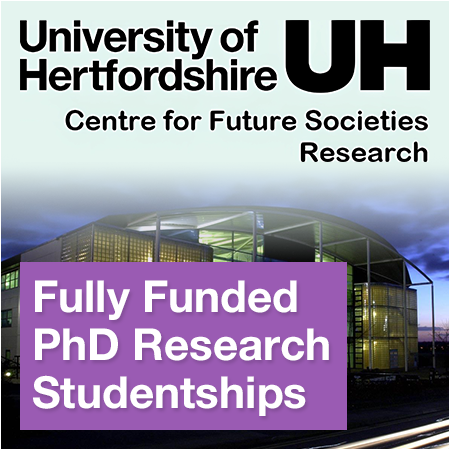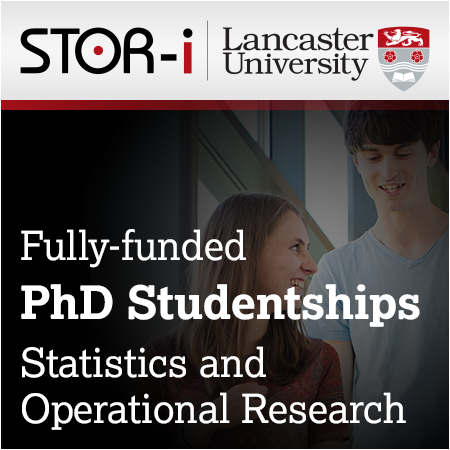Please start typing and select a location from the list
42 PhDs Found
Clear All
Biological Sciences
Health & Medical
Anatomy, Physiology & Pathology
Biochemistry
Biology
Botany
Genetics
Medical Technology
Medicine & Dentistry
Microbiology
Molecular Biology & Biophysics
Nursing
Nutrition
Other Biological Sciences
Pharmacology, Toxicology & Pharmacy
Zoology
PhDs
£10,000 - £14,999
£15,000 - £19,999
£20,000 - £24,999
Search
Sort
The job you're looking for is no longer being advertised. Please see below for similar jobs.
42 PhDs Found
PhD Studentship - Molecular Applications for Malagasy Fish (MAppFish): Developing a Rapid, Cost-effective Method for Mapping Distributions of Freshwater Fish in a Global Biodiversity Hotspot
Manchester Metropolitan University
Location:
Manchester
Salary:
£20,780
- please see advert
Date Placed: 19 May
Closes
17 Jun
PhD Studentship - Development of a Cell-based Model to Understand Placental Damage in Pre-eclampsia and Test Novel Therapeutic Approaches
Manchester Metropolitan University
Location:
Manchester
Salary:
£20,780
- please see advert
Date Placed: 19 May
Closes
17 Jun
PhD Studentship - The Impacts of Introduced Large Woody Structures on Aquatic Macroinvertebrate Diversity and Sediment Dynamics in UK River Systems
Manchester Metropolitan University
Location:
Manchester
Salary:
£20,780
Date Placed: 19 May
Closes
16 Jun
PhD Studentship: Kidney Disease and Haemodialysis: Understanding the Patient Experience to Improve Treatment
Pharmacy
University of Reading
Location:
Reading
Salary:
£20,780
for 2025/26
Date Placed: 16 May
Closes
31 Jul
Cancer And Genomics: Fully Funded Sures PhD Scholarship, Multi-Omics Approach to Characterise an in Vitro Lung Model as a Predictive Tool for Human Health
Biosciences; Cancer and Genomics
Swansea University
Location:
Swansea
Salary:
£20,780
for 2025/26
Date Placed: 14 May
Closes
02 Jun
PhD Studentship: Label-free Method for Real-Time Dynamics of Membrane Proteins
Aston Institute for Membrane Excellence
Aston University
Location:
Birmingham
Salary:
£20,780
tax-free annual stipend
Date Placed: 13 May
Closes
01 Jun
PhD Studentship: Experimental Investigation of Pharmaceutical Tablet Disintegration and Drug Release
University of Surrey
Location:
Guildford
Salary:
£20,780
Stipend
Date Placed: 08 May
Closes
01 Jun
PhD Studentship in Psychology: Probiotics for Depressive Symptoms, Associated Behavioural Outcomes and Neural Activation: a 3-year PhD Project
School of Psychology and Clinical Language Sciences
University of Reading
Location:
Reading
Salary:
£20,780
p.a.
Date Placed: 08 May
Closes
27 Jun
PhD Studentship: at the University of Exeter and NIHR Healthtech Research Centre (HRCs) for Brain Health: Using APOE-associated AD resilience to identify potential biomarkers
HLS
University of Exeter
Location:
Devon, Exeter
Salary:
£19,237
annual stipend
Date Placed: 07 May
Closes
27 May
PhD Studentship - Assessment of Force Production Characteristics using Portable Force Assessment Technologies in Military Personnel with Knee Injuries
University of Salford
Location:
Salford
Salary:
£19,237
in Year 1 PA for three and a half years
Date Placed: 06 May
Closes
21 May
PhD Studentship - Assessment of Force Production Characteristics using Portable Force Assessment Technologies in Military Personnel with Ankle Injuries
University of Salford
Location:
Salford
Salary:
£19,237
in Year 1 PA for three and a half years
Date Placed: 06 May
Closes
21 May
PhD Studentship in Artificial Intelligence in Medical Imaging and Diagnostics
Faculty of Engineering and Physical Sciences EPSRC Project Proposals 2025/26 - Computer Science
University of Leeds
Location:
Leeds
Salary:
£20,780
Date Placed: 01 May
Closes
02 Jul
Cancer Research Wales Fully Funded 3-year PhD Studentship: Exploiting Synthetic Lethality for Cancer Treatment: Improving the Activity and Specificity of Novel MRE11 Inhibitors
Bangor University
Location:
Cardiff
Salary:
£19,237
per annum for 3 years
Date Placed: 01 May
Closes
01 Jun
PhD Studentship - Preclinical Evaluation of Spinal Therapies
Faculty of Engineering and Physical Sciences EPSRC Project Proposals 2025/26
University of Leeds
Location:
Leeds
Salary:
£20,780
Date Placed: 30 Apr
Closes
30 May
PhD Studentship - Feasibility of a Culturally Tailored Cancer Prehabilitation for the South Asian Community
Manchester Metropolitan University
Location:
Manchester
Salary:
£20,780
Date Placed: 25 Apr
Closes
19 May
PhD Studentship - To Develop Methodology to Measure Alzheimer’s Disease Biomarkers in the Plasma of Obstructive Sleep Apnoea Patients
Manchester Metropolitan University
Location:
Manchester
Salary:
£20,780
Date Placed: 25 Apr
Closes
27 May
PhD Studentship - Investigating the Pathophysiological Effects of Environmental Carbon Monoxide Exposure on the Developing Cardiovascular System During Pregnancy
Manchester Metropolitan University
Location:
Manchester
Salary:
£20,780
Date Placed: 23 Apr
Closes
29 May
PhD Studentship - Multimodal AI for Health and Emotional Assistance
Manchester Metropolitan University
Location:
Manchester
Salary:
£20,780
Date Placed: 23 Apr
Closes
19 May
PhD Studentship - Prehabilitation for Individuals Awaiting Urgent Heart Transplantation
Manchester Metropolitan University
Location:
Manchester
Salary:
£20,780
- please see advert
Date Placed: 23 Apr
Closes
31 May
PhD Studentship - Fostering Well-Being and Mental Health of Elite Soccer Match Officials
Manchester Metropolitan University
Location:
Manchester
Salary:
£20,780
- please see advert
Date Placed: 23 Apr
Closes
30 May
PhD Studentship - Characterising the Nutritional Requirements of Professional Soccer Match Officials
Manchester Metropolitan University
Location:
Manchester
Salary:
£20,780
- please see advert
Date Placed: 23 Apr
Closes
30 May
PhD Studentship - The Acute Physical, Physiological, and Perceptual Responses to Training and Competition in Elite Referees
Manchester Metropolitan University
Location:
Manchester
Salary:
£20,780
- please see advert
Date Placed: 23 Apr
Closes
30 May
PhD Studentship - Ecoacoustic Monitoring of Biodiversity in Human-modified Tropical Forests
Manchester Metropolitan University
Location:
Manchester
Salary:
£20,780
- please see advert
Date Placed: 23 Apr
Closes
19 May
PhD Studentship - Engineering, Biological and Environmental Benefits of Visible-light Activated Antimicrobial Photocatalytic Coatings for Water Treatment
Manchester Metropolitan University
Location:
Manchester
Salary:
£20,780
- please see advert
Date Placed: 23 Apr
Closes
19 May
PhD Studentship: Para Athlete Physiological Responses to Heat Stress
School of Design and Creative Arts
Loughborough University
Location:
Loughborough University, Loughborough
Salary:
£20,780
per annum
Date Placed: 23 Apr
Closes
29 May
×
Max Saved Jobs Reached
A maximum of 500 Saved Jobs can be created against your account. Please remove an existing Saved Job in order to add a new Saved Job.
Manage Saved Jobs
Page 1 of 2 >> Next



-17461758859.png)





